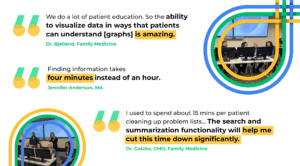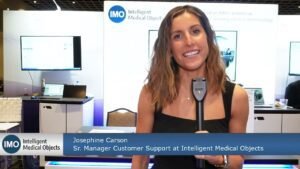I’ve always said that some of the most interesting things in health IT are when someone brings together the right mix of technology, partners, and users to do something that they couldn’t possibly do alone. I sometimes refer to this as health IT needing to put together the right packaging. The best example of this in our personal lives was when the iPhone was launched. There wasn’t much that Apple invented itself in the original iPhone, but what they did amazingly well was to package all of the various technologies such that the iPhone has transformed the world.
The same is true in health IT. We have a plethora of amazing technologies, but we need to do more work on how we package them. That’s why I was so intrigued by this session at HIMSS 2024 titled Radical Collaboration: MEDITECH, Google, and the Intelligent EHR. It featured Helen Waters, Executive VP & COO at MEDITECH, Aashima Gupta, Global Director, Healthcare Strategy and Solutions at Google Cloud, and Dara Bartels, CEO at Mile Bluff Medical Center.
As Waters said on stage, “Progress will not happen in silos. We need to collaborate to make the most impact. That’s why you see an EHR, a tech company, and a health system on stage.” Here’s a summary of some of the key insights from the session along with some commentary.
It was great to have all three of these healthcare executives on stage to talk about the collaboration. I particularly liked that it was the CEO of a provider organization on stage. The CIO would be obvious at an event like HIMSS. The CEO is more rare, so it was great to hear the CEO perspective on the project and how it aligns with their strategic goals.
Waters introduced a key goal of the collaboration which was to reduce burnout in healthcare. She aptly noted that burnout in healthcare seems to be pretty universal regardless of the tech stack you use. We need to do something to address it.
Waters also highlighted MEDITECH’s commitment to building an open platform that enables collaboration opportunities like the one we’re highlighting in this article with Google Cloud.
Some may look at this timeline and think it’s not that quick, but in healthcare this is certainly a quick timeline. This was particularly interesting for me since I remember being at the MEDITECH CIO forum where they talked about this collaboration with Google Cloud. It’s great to see that in 1.5 years the collaboration has really come together to drive tangible benefits for MEDITECH users.
The evolution of what we are focused on in health IT is pretty stark. I remember when the EHR was just a billing machine and was totally focused on optimizing and improving billing. Not that billing and the cash ROI of health IT and EHR software isn’t important, it’s still great to see an expansion of priorities to include things like efficiency, reduced burden, better experience, and improved outcomes.
Gupta highlighted a key message from HIMSS 2024. Generative AI has captured so much attention, but it’s not always the solution. In fact, many times all you really need to do is surface the right data or apply things like machine learning. No doubt the word AI has been corrupted to include things like machine learning and analytics. Plus, some of the most novel solutions in healthcare are a mix of all of these technologies.
Bartels described the impact of the search and summarization feature from MEDITECH and Google Health by sharing how it helped her reduce staff burden — a big win for healthcare organizations today.
One of the struggles for EHR vendors is getting users to adopt new features and functions so it’s heartening to see so many users start to use this feature so quickly.
One of the most amazing data points shared in the presentation was a look at what the summary screen looked like. The summary screen itself wasn’t all that shocking since we’ve all seen a patient summary screen. What was eye opening was that the summary screen had summarized 101 pages of surgical history. Imagine being a doctor needing to review 101 pages versus a nice summary screen. That’s the power of this collaboration.
Bartels shared how much the above summarization featured had helped the workflow in their organization. I think we all want to go to the doctor who wants to review the record for 2 weeks in detail, but we also likely don’t want to wait the 2 weeks to see them. Credit goes to that doctor for being that thorough, but it’s great to see how technology can streamline that process for even the most thorough doctor.
This statement by Bartels that the search and summarization feature was one of the first health IT projects in a long time that hadn’t added burden to the patient or provider was pretty sad to hear. Mostly because we likely know it’s the case. We’ve covered many times on here that as we added more health IT solutions, we often demanded more from providers and patients. That led to much of the added burden that doctors experience. The good news is that features like this one and many that I see on the horizon are going to deliver reduced burden the way IT solutions have helped other industries.
No doubt these are anecdotal responses from physicians, but each of these makes a big impact in aggregate for an organization.
It was great to learn more details on the search and summarization feature that MEDITECH and Google Health had collaborated on and the impact it had on one of their customers. Plus, that’s just a small portion of what MEDITECH’s AI plans include. The right partners coming together to apply AI is going to be applied to patients, care teams, and the health system as a whole. This list of other applications of AI is exciting. What’s more exciting though is that we’re likely to discover many more applications of AI beyond this list as the technology continues to evolve. Needless to say, this collaboration and the impact it’s had is a small preview of what’s to come in the future.
MEDITECH is a proud sponsor of Healthcare Scene.
Get Fresh Healthcare & IT Stories Delivered Daily
Join thousands of your healthcare & HealthIT peers who subscribe to our daily newsletter.




